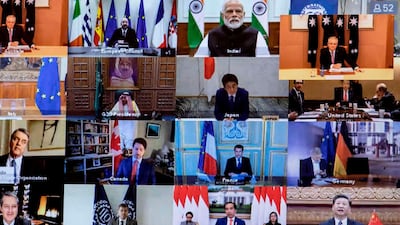G20 finance ministers and central bank governors will meet this week to discuss and take urgent joint actions needed to address the impact of the coronavirus pandemic on the global economy.
The financial policymakers from the world's 20 biggest economies will hold their virtual meeting on April 15 under the Saudi G20 Presidency, according to a statement from the secretariat.
Traditionally, the April G20 finance ministers and central bankers’ meeting is held in Washington on the sidelines of the spring meetings of the International Monetary Fund and World Bank, which are also being held virtually this year as a result of the pandemic.
The aim is to “safeguard the stability of the global economy and financial markets, restore confidence, and prevent deep and prolonged negative economic impacts", the G20 said in a statement.
The G20 group is finalising a proposal for a six or nine month freeze on bilateral government loan repayments or until 2021, to give lower income countries buffering space and help mitigate the prospect of an emerging markets debt crisis, the Financial Times reported on Monday, citing a senior G20 official. The IMF and the World Bank have called for debt relief for 76 of the world's poorest nations.
Given the global circumstances and the urgency to take coordinated action, meetings are being held more frequently as G20 governments roll out measures to buttress their economies in the face of the pandemic which has brought the global economy to a halt.
The meeting this week follows a video conference of finance ministers and central bank governors on March 24, which ended with an agreement to develop a G20 action plan in response to the coronavirus. Ministers agreed to closely monitor the pandemic, its effects on financial markets and act further to support the global economy.
“Since the last meeting of G20 finance ministers and central bank governors in February, the global economy outlook has significantly deteriorated," Saudi Arabia's Finance Minister Mohammed Al Jadaan said on March 24.
In their February meeting the group had expected a modest uptick in the global economy this year and next, but said growth remains vulnerable to geopolitical risks, trade tensions and policy uncertainties.
However, the rapid spread of the virus across Asia, Europe and North America has drastically altered the global economic scenario.
The world is now facing its biggest economic challenge since the Great Depression. The global economy, which is now in a recession, according to the IMF, is forecast to contract more than 1.5 per cent this year by some estimates. The IMF expects the economy to rebound only next year.
Governments worldwide have rolled out more than $8 trillion (Dh29.4tn) in stimulus packages to support their economies and stem unemployment amid lockdowns and movement restrictions. Nearly 17 million Americans have lost their jobs in the last three weeks.


